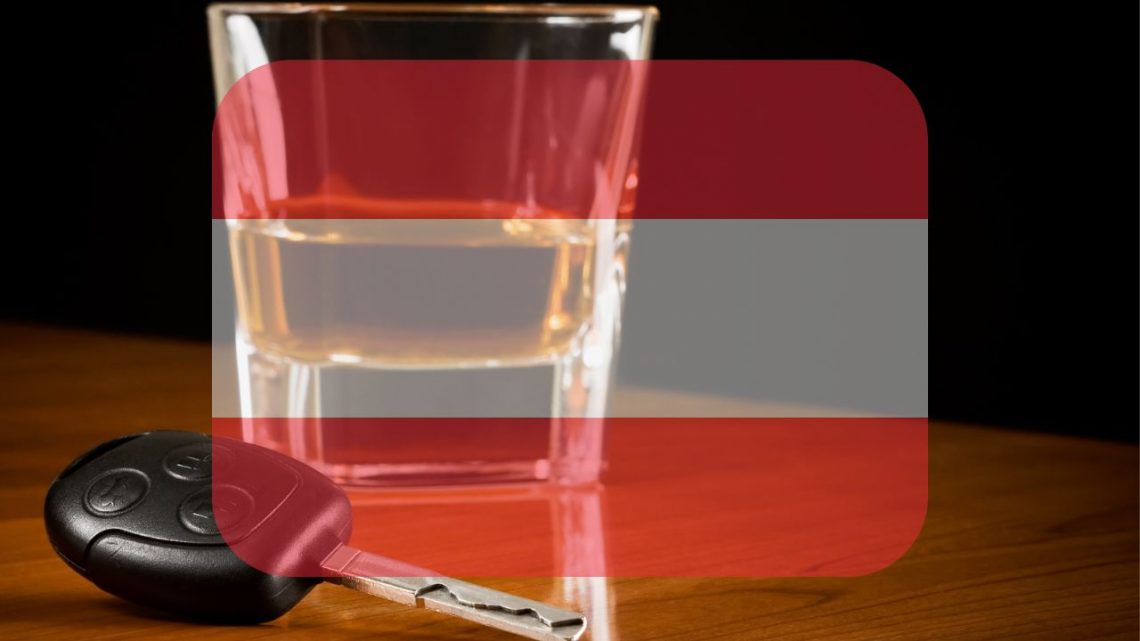In Austria, drivers are legally required to maintain a blood alcohol content (BAC) below 0.05%, equivalent to less than 0.5 grams of alcohol per liter of blood.
This page aims to raise awareness about the dangers of driving under the influence in Austria. This site does not support or encourage impaired driving, regardless of the country or region.
What is the legal alcohol limit for driving in Austria?
In Austria, the legal alcohol limit for drivers varies based on their experience and profession. Ensuring road safety, the country has established specific blood alcohol content (BAC) limits for different categories of drivers:
- Regular Drivers: The legal BAC limit is set at 0.05%, which translates to 0.5 grams of alcohol per liter of blood.
- Novice and Professional Drivers: For those new to driving or driving professionally, the legal limit is stricter, at 0.2 grams of alcohol per liter of blood.
Drink and Drive Penalties and Punishments in Austria
Since the implementation of stricter blood alcohol content (BAC) regulations in 2011, Austria has enforced specific legal limits and corresponding penalties for driving under the influence of alcohol. The legal BAC limits are set at 0.5 grams per liter for regular drivers and a lower threshold of 0.2 grams per liter for novice and professional drivers. This adjustment followed a significant reduction in the BAC limit from 0.8 g/l to 0.5 g/l in 1998, with specialized limits for novice drivers introduced in 1992 and for bus and heavy goods vehicle drivers in subsequent years.
Penalties for exceeding these limits vary by the driver’s BAC level and include fines, driving bans, and other rehabilitative measures designed to prevent repeat offenses. Below is a detailed overview of the sanctions according to BAC levels:
- For BAC levels 0.1 – 0.49 g/L (specific categories):
- No driving ban
- Fines ranging from €36 to €2180
- 1 penalty point (out of 3 in the system)
- Mandatory psychological driver improvement courses after a second offense
- For BAC levels 0.5 – 0.79 g/L:
- No driving ban
- Fines from €363 to €2180
- Similar penalties and conditions as the previous category
- For BAC levels 0.8 – 1.19 g/L:
- A 1-month driving ban
- Fines between €300 and €3700
- Traffic coaching, including DUI consequences and behavioral change strategies
- For BAC levels 1.2 – 1.59 g/L:
- Driving bans starting from 4 months
- Fines from €800 to €3700
- Optional participation in alcohol interlock programs after half the license withdrawal period
- For BAC levels above 1.6 g/L:
- Driving bans from 6 months
- Fines between €1200 and €4400
- Mandatory participation in rehabilitation programs and psychological assessments
Recidivism: Repeat offenders within five years face increased penalties, including longer suspension periods and mandatory rehabilitation courses.
Alcohol Interlock Programs: Introduced in 2017, this program offers an alternative to license withdrawal for offenders caught with BAC levels of 1.2 g/L or above. It includes the installation of alcohol interlocks in vehicles and regular mentorship, aiming to ensure compliance and facilitate behavioral change.
The penalties and programs in Austria emphasize rehabilitation and responsible driving. It’s essential for drivers to frequently check the official state website for the latest information on drink and drive penalties and legal updates to remain informed and compliant.
How can I calculate if my alcohol blood limit is legal in Austria
In Austria, the police determine a driver’s blood alcohol content (BAC) level primarily through breathalyzer tests during traffic stops or checkpoints. These tests are designed to quickly assess whether a driver is under the influence of alcohol and if their BAC exceeds the legal limits set by Austrian law.
As an experienced phlebotomist with over a decade of expertise, I recommend two effective methods for individuals to self-assess their BAC levels, helping ensure they stay within legal limits and promote safer driving practices:
- Use a High-Quality Alcohol Breathalyzer: For those looking to accurately estimate their BAC, investing in a reliable alcohol breathalyzer is key. Based on my professional experience, the BACtrack S80 is one of the most accurate devices available in Austria. It is known for its Professional-Grade Accuracy and is DOT & NHTSA Approved as well as FDA 510(k) Cleared. Keeping a BACtrack S80 in your vehicle is highly advisable, as it can help you understand your BAC level accurately, aiding in the prevention of impaired driving. Many individuals underestimate their level of intoxication, leading to unsafe driving conditions.
- Utilize My BAC Calculator: Alongside fellow phlebotomists and with the help of web developers, I’ve developed an online BAC calculator. This tool is designed to provide an estimated BAC level based on the alcohol consumed, taking into account factors like weight, gender, and the type and amount of alcohol ingested. It’s an accessible way to gauge whether you’re approaching or exceeding the legal BAC limit in Austria.
It’s crucial to remember that while both these methods offer valuable estimates, they cannot guarantee 100% accuracy in every situation. Factors such as metabolism, recent meals, and individual health conditions can affect BAC levels and how alcohol impacts your body. Therefore, these tools should be used as guidelines to assist in making safer decisions about driving after consuming alcohol. They are meant to provide awareness and help prevent drunk driving by giving you a clearer idea of when you might be over the 0.05% limit. Always err on the side of caution and consider alternative transportation if there’s any doubt about your sobriety.
Ways to Avoid Driving with a High BAC in Austria

Driving with a high blood alcohol content (BAC) not only poses a significant risk to your safety and that of others but also carries severe legal consequences in Austria. Here are some practical tips to ensure you stay within the legal limits and avoid the risks associated with drink-driving:
- Use a Taxi or Ride-Sharing App:
- In today’s connected world, finding a ride home after drinking has never been easier. Utilize popular taxi apps like Uber or local taxi services to ensure a safe trip home. For instance, if you’re in Vienna, consider booking a ride with Vienna Airport Cab or exploring options like Taxistoi-linz if you find yourself in Linz. These services provide a convenient and safe alternative to driving under the influence, ensuring you reach your destination without compromising on safety.
- Opt for a Designated Driver Service:
- If you’ve driven to a location and then consumed alcohol, leaving your car behind might not always be an option you’re comfortable with. In such cases, designated driver services are a fantastic solution. These services offer to drive you home in your own car, ensuring both you and your vehicle get back safely. Companies like Priver.at in Vienna or Private Chauffeur Linz in Linz offer such services. A simple Google search for “designated driver service” followed by your city name can help you find a suitable provider. This not only helps you avoid driving under the influence but also prevents the inconvenience of retrieving your car the next day.
By planning ahead and choosing alternatives to driving after consuming alcohol, you can significantly reduce the risk of accidents and legal issues associated with high BAC levels in Austria. Always remember, the best strategy is to not drive at all if you plan to drink.
Sticking to Drink and Drive Laws in Austria: Sad Statistics
Drink-driving contributes to less than 10% of road-related injuries and fatalities in Austria, with 32 out of 416 road deaths in 2019 attributed to alcohol. The country is proactive in combatting this issue, conducting around 1.8 million alcohol tests in 2019, revealing a positive rate of 1.7%. This underscores Austria’s commitment to road safety and the effectiveness of its enforcement measures.
To ensure safety, individuals should refrain from driving after consuming alcohol and opt for safer transportation alternatives like authorized driving services or taxis. Being informed about local drunk driving regulations and using alcohol breathalyzers to monitor blood alcohol levels can further prevent impaired driving.
For those seeking detailed information on drunk driving laws and safety precautions, Austria’s official website offers comprehensive resources. It’s crucial for drivers to recognize the risks associated with alcohol consumption and driving, and to make responsible choices that prioritize safety for all road users.







